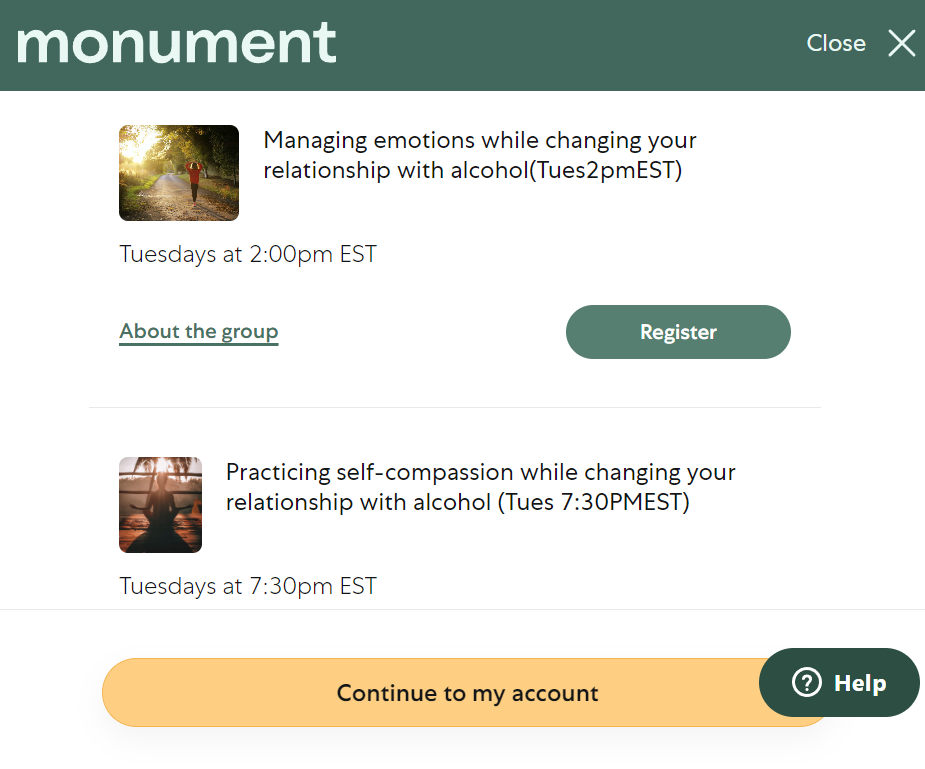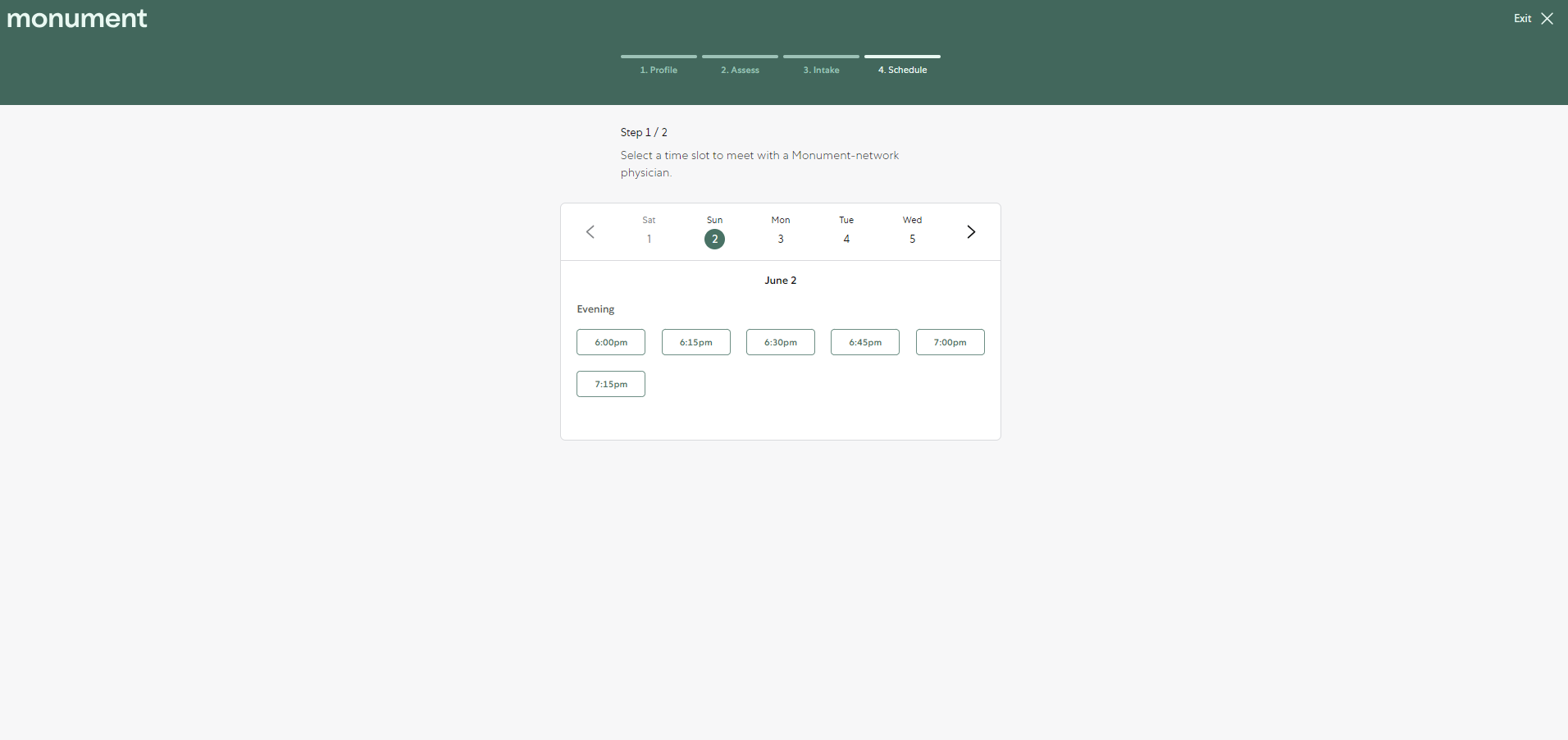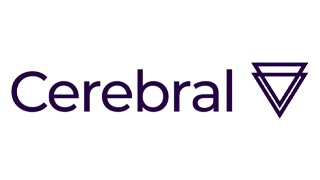Table of Contents
Almost 30 million people ages 12 and older in the United States were diagnosed with alcohol use disorder (AUD) in 2022. However, according to a 2022 survey, only 2 million people received treatment between 2021–2022. There are many reasons for why people don’t seek help for alcohol abuse. They may be concerned about encountering stigma from their community, fear they can’t function without alcohol, or worry that treatment may be inaccessible or too expensive.
Online mental health platforms may help to remove some of those barriers. Monument, an online therapy platform, focuses on supporting those who want to change their drinking habits or quit altogether, but it’s important to consider whether it’s the right platform for you or whether you should seek support elsewhere.
Monument is an online therapy platform specifically focused on people with alcohol use disorder. It has physicians on staff who can prescribe medications, but also offers therapy and other areas of support that can be important for long-term success.
“While online treatment programs provide a convenient option for alcoholism treatment, it’s crucial to make sure it’s the right fit for you,” says Jacqueline Keating, a clinician at Mountainside Treatment Center.
The Handbook Team researched and tested the platform to help you determine if Monument is the best online therapy platform for your needs.
Monument overview
In a mental health emergency:
Online therapists may not be the most appropriate resource to help in a mental health crisis. If you or someone you know is a danger to themselves or others around them, it is an emergency, and cannot wait for an online therapist’s response.
Don’t wait. You can find help immediately by:
- Visiting urgent care
- Calling or texting 988 for the Suicide & Crisis Lifeline
- Chatting online at 988lifeline.org
- Calling the Substance Abuse and Mental Health Services Administration (SAMHSA)’s Helpline at 800-662-4357 or texting your zip code to 435748
All of the above options will connect you with trained professionals who can provide crisis support. You can find even more resources, including international options, on our helpline directory page.
Insights from our testers
Monument is an online platform focused on helping people reduce alcohol consumption or stop drinking altogether. You can schedule therapy sessions to help you deal with the mental health component of your drinking. Physician meetings are also available, where you can get a prescription for medication as a part of your treatment plan. Both types of appointments are offered as video sessions on Monument’s platform.
The platform has a foundational workbook course designed to help with a holistic approach to recovery—examining your emotions, relationships, habits, and the mindset needed for your healing journey.
Monument offers other resources, too, like moderated support groups, a community forum, a drink tracker, and videos with resources and lesson summaries. Unfortunately, some online group therapy sessions are not well-attended, which can be disappointing if you want to connect with a wide range of people.
Providers and resources on Monument help you figure out what’s behind your drinking and what strategies you can put in place to address your compulsions in a positive way.
To get started with Monument, you first sign up for its community membership. For $14.99, billed each month, you receive daily affirmations, a drink tracker, access to virtual moderated support groups, and an anonymous community forum.
You can add additional services after signing up. If Monument accepts your insurance carrier, individual therapy appointments can be paid for using insurance. Therapy includes video sessions and the ability to chat with your therapist via messaging. Once you select this option, you are matched with a therapist and can choose weekly or biweekly hour-long sessions.
You can also add on medication-assisted treatment with a licensed doctor. Monument physicians can prescribe Naltrexone or Disulfiram to aid with alcohol abuse treatment if they determine it’s appropriate for a patient. Physician sessions are 45-minute-long video appointments and you can message your provider between appointments.
Though community membership is the launching pad of Monument’s program, our Handbook Team had mixed experiences with the effectiveness of its features.
One of our Monument testers was frustrated to find that there was little activity in the group chat they joined, and no one showed up for one of the group sessions they wanted to participate in. However, another group session they joined had 20 people on the call, with a moderator who provided excellent feedback and support.
Finding a group session you feel comfortable attending may depend on time of day, how many attendees are present and whether a moderator is guiding the discussion effectively, and whether you feel supported and heard within the group’s cultural makeup. Ongoing research suggests that people with substance abuse disorders are most likely to find the support they need in groups of peers that closely match their own ethnicity, race, gender, or sexual orientation. If you want the benefits that can come from interacting and bonding with other people in recovery but feel uncomfortable in a peer group you have joined, don’t give up. There are plenty of different peer support groups available.
From one of our Monument testers
“There are lots of support groups, and you can filter them by topic, time, or moderator. I appreciate that there appears to be at least one group call past 5 p.m. every day of the week, which is great for working professionals.”

How to sign up for Monument online alcohol treatment
You start the process by creating an account on the Monument website and signing up for a community membership. Our Handbook Team found it easy to sign up and connect to the online community. After becoming a member, you can add weekly or biweekly talk therapy sessions, or request a physician to help you determine whether medication-assisted treatment sessions are appropriate for you.
How to match with an online therapist
After you sign up for the therapy add-on, you take a self-assessment, answering questions about your alcohol use. Then, you complete a medical intake form, providing details on your medical history, such as whether you have any chronic health conditions (e.g., heart disease, kidney disease), and past hospitalizations or surgeries. Once you finish both forms, you are brought to a scheduling page.

The platform allows you to select days and times that work best for you, but the rest of the setup was a bit confusing for our Handbook Team. “There was no way to filter for times or providers,” one of our Monument testers says. “All I could do was look at the available days and times that you could make an appointment.”
After selecting an appointment time, our tester was given only two therapists to choose from. The inability to see all available therapists and physicians makes it difficult to know the level of provider diversity offered by Monument.
Live video sessions
Therapy and physician appointments are held via live video sessions on the Monument platform. You can access the video sessions from your phone, computer, or tablet.
Messaging
Clients can message their therapist and physician between sessions. Response times to messages can vary based on your provider’s work schedule. Ask your therapist or physician how often they’ll be able to respond to your messages and what the wait time for a response might be so you know what to expect.
Talk to your provider as well about what you should do if you need more immediate help and cannot wait for a reply. Ask for guidance on what you need to do to take care of yourself if you’re having a medical or mental health crisis and they are not available.
Customer service
You can contact customer service via email. The platform states that you can expect a response within 24–48 hours. One tester sent an email with questions and received a response the next day. However, the second time they reached out, the response came back more than 48 hours later. Another tester received an email response within an hour of sending their message.
You can also contact customer service by phone, but one tester had difficulty reaching them. Each time they dialed, the call went to an automated answering service and they were instructed to leave a message. The answering machine stated they would receive a call back in 24–48 hours.
What other users are saying
Our testers think that Monument has a lot to offer. They appreciate having a platform that caters to the specific needs of those with alcohol use disorder. Research has found that peer groups can be beneficial to the treatment of addiction, which makes Monument’s group sessions and community forums helpful resources.
Despite the benefits, our Handbook Team did have concerns. “[T]he actual execution of this service is not great. The support channels did not appear super active,” one reviewer says.
Our testing experience






Our Handbook Team is dedicated to providing you with an in-depth look at the online therapy experience. We have put in over 10,000 hours of research on numerous online therapy platforms. We go behind the paywall to give you a firsthand look at what it’s like to be a client. We’ve surveyed other platform users, conducted interviews, and received insight from mental health experts.
With Monument, we also attended online support groups and community forums to tell you about the process and what you can expect. We tested the additional tools the platform offers to help you on your sobriety journey and looked at the user experience, from joining the service to scheduling a therapy appointment. We also examine the diversity of the platform’s therapists, the costs, and the customer service experience. Our goal is to give you a holistic look at what it’s like to use Monument to help treat alcohol use disorder and alcohol dependency.
How we tested Monument
Our Handbook Team explored the Monument platform to analyze its resources and features. We instruct testers to try the platform through the lens of a real user, paying attention to how easy or difficult it was to find a provider they could talk to. Our testers log their experience in a diary and share their findings when testing is concluded. We used these findings and our research into online therapy to write this Monument review.
Compare Monument to other online therapy platforms
Monument’s costs and services align with several of the other online therapy providers we’ve researched. Monument differs in that its clients are required to sign up for community membership before they can opt to receive therapy or medication management. If you’re looking for online therapy that takes insurance, then Monument is a good choice. While the platform does have medication management available, it is limited to two drugs for alcohol abuse treatment. Because of Monument’s limited scope of treatment, it is not one of our choices for the best online psychiatry platforms.
| Monthly cost | $14.99 community membership fee; $149–$249 for therapy; $100 per physician visit | $276–$436 for therapy; $299 for initial psychiatric evaluation and $175 for follow-up sessions | $299 for therapy; $95 for psychiatry; $349 for therapy and psychiatry | Varies by provider | $295 for therapy; $95 for psychiatry; $365 for therapy and psychiatry |
| Insurance accepted? | Yes | Yes | Yes | Yes | Yes |
| Services | Individual and teen therapy; medication- assisted treatment for alcohol use disorder | Individual, teen, and couples therapy; psychiatry | Individual and teen therapy; psychiatry | Individual, teen, children, and couples therapy; psychiatry | Individual and couples therapy; psychiatry |
How much does Monument cost?
To get started on Monument, you must pay $14.99 per month for a community membership, which gives you access to support groups, an online forum, and other helpful resources for alcohol use disorder. You can then add on therapy and/or physician appointments for an additional cost. You cannot use your health insurance to cover the community membership fee, but you can use it to cover the therapist and physician fees, and any medication costs.
- Two sessions per month: $149.
- Four sessions per month: $249.
Physician appointments for medication assistance:
- $100 per appointment.
Is Monument covered by insurance?
Monument accepts many major insurance providers, including Medicare, which you can use for therapy and physician sessions. The cost of your copay will depend on your insurance coverage and plan. Keep in mind that the $14.99 monthly community member fee is not covered by insurance and is an out-of-pocket cost.
*Please contact your insurance company in advance to confirm that these services are covered.
How to save money on Monument
The company does not advertise any financial aid, sliding scale, or discount options. However, compared to other platforms we’ve reviewed, like BetterHelp, Monument does offer therapy and medication management at a lower cost, making it an affordable online therapy option.
Our final verdict
Monument is an online therapy platform that aims to help people deal with drinking problems or overcome alcohol addiction. The platform offers therapy, medication management, and other mental health tools to support those who want to reduce their alcohol consumption or stop drinking altogether. Monument provides support groups and chat forums to help users find a sense of community.
Our testers had mixed experiences with the support groups and chats. Some were lackluster due to low attendance or participation, while others were well attended and engaging. Peer support can be a very effective tool to aid your sobriety journey if you find an engaged group of people who are invested in their long-term recovery.
To learn about other treatment options, read our article Overcoming Alcohol Addiction.
Frequently asked questions
Monument physicians can prescribe Naltrexone and Disulfiram (Antabuse), both FDA-approved drugs used to treat alcohol dependency. It’s important to know that they are not a cure for dependency. Naltrexone is used to reduce the desire for alcohol and block the dopamine release associated with alcohol consumption. Disulfiram causes unpleasant side effects like headaches and nausea when alcohol is used, thereby reducing the desire for alcohol. Neither of these drugs are appropriate for people with serious health conditions like heart or liver disease.
To start using the Monument platform, you sign up for a community membership. You then have the option to add on weekly or bi-weekly therapy sessions or physician appointments for medication-assisted treatment.
Stanford Medicine says being a part of Alcoholics Anonymous (AA) is the most effective way to treat alcoholism—and many experts agree.
“A major reason that AA and facilitated in-person group therapy are the most effective interventions is that listening to other peoples’ stories can be powerful. And getting to know the people in the group means that you come to care about each other,” says Alice Feller, a clinical psychiatrist and addiction specialist based in San Francisco, California.
- National Institute on Alcohol Abuse and Alcoholism. (2023). Alcohol Use Disorder (AUD) in the United States: Age Groups and Demographic Characteristics. National Institutes of Health. Link
- National Institute on Alcohol Abuse and Alcoholism. (2024). Alcohol Treatment in the United States. National Institutes of Health. Link
- National Institute on Alcohol Abuse and Alcoholism. (2024). Alcohol and the Human Body. National Institutes of Health. Link
- National Institute on Alcohol Abuse and Alcoholism. (2021) The Cycle of Alcohol Addiction. National Institutes of Health. Link
- Canver, B.R., Newman, R.K., & Gomez, A.E.. (2024, February 14) Alcohol Withdrawal Syndrome. StatPearls. Link
- Substance Abuse and Mental Health Services Administration (SAMHSA). (2021) Treating Concurrent Substance Use Among Adults. U.S. Department of Health and Human Services Link
- Bayard, M., McIntyre, J., Hill, K.R., & Woodside, J. (2004, March 15) Alcohol Withdrawal Syndrome. American Family Physician. 69(6),1443-1450. Link
- Zemore, S.E., Gilbert, P.A., Pinedo, M., Tsutsumi, S., McGeough, B., and Dickerson, D.L. (2021, March 11). Racial/Ethnic Disparities in Mutual Help Group Participation for Substance Use Problems. Alcohol Research, Current Reviews. 41(1). Link
- Recovery Research Institute. Peer-Based Recovery Support. Link
- Tracy, K. & Wallace, S. (2016, September 29). Benefits of peer support groups in the treatment of addiction. Substance Abuse and Rehabilitation, 7, 143–154. Link
- Erickson, M. (2020, March 11). Alcoholics Anonymous most effective path to alcohol abstinence. Stanford Medicine. Link










